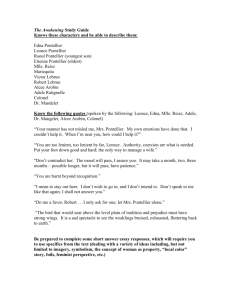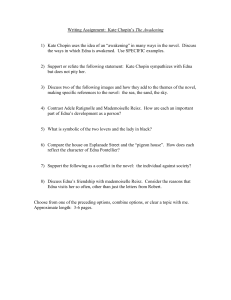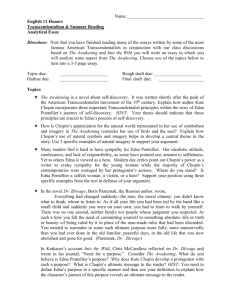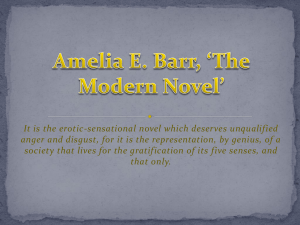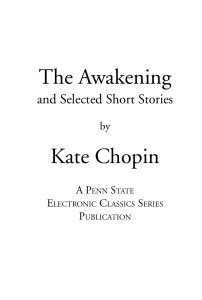The Awakening Study Guide Materials to Study/ Review Chapter 1
advertisement
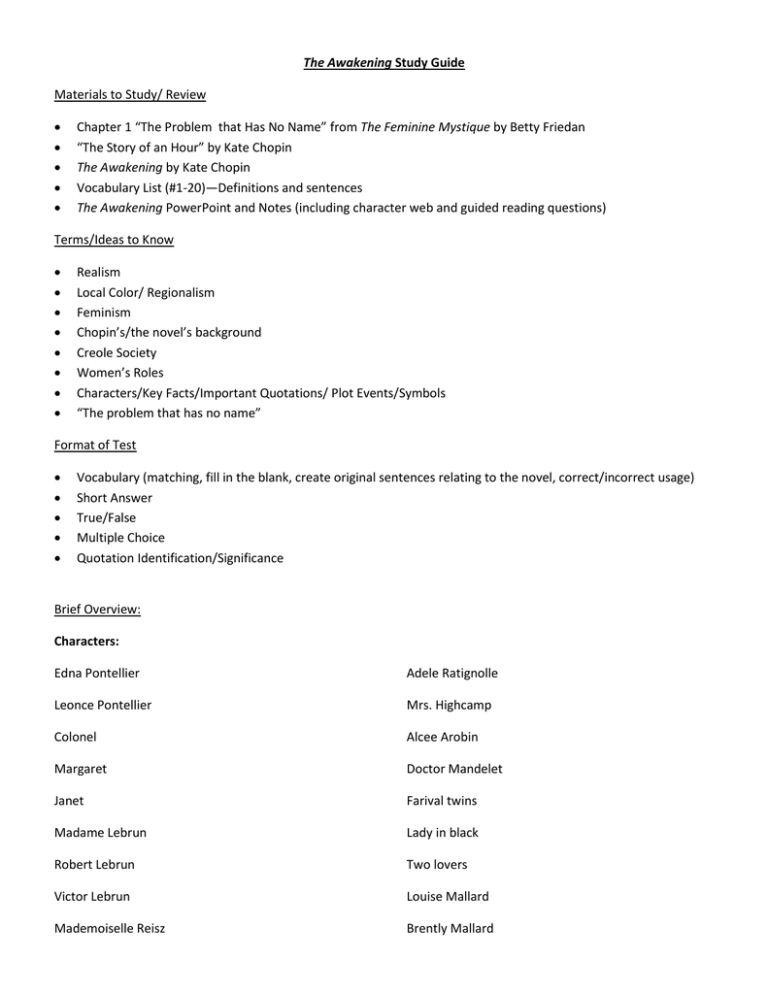
The Awakening Study Guide Materials to Study/ Review Chapter 1 “The Problem that Has No Name” from The Feminine Mystique by Betty Friedan “The Story of an Hour” by Kate Chopin The Awakening by Kate Chopin Vocabulary List (#1-20)—Definitions and sentences The Awakening PowerPoint and Notes (including character web and guided reading questions) Terms/Ideas to Know Realism Local Color/ Regionalism Feminism Chopin’s/the novel’s background Creole Society Women’s Roles Characters/Key Facts/Important Quotations/ Plot Events/Symbols “The problem that has no name” Format of Test Vocabulary (matching, fill in the blank, create original sentences relating to the novel, correct/incorrect usage) Short Answer True/False Multiple Choice Quotation Identification/Significance Brief Overview: Characters: Edna Pontellier Adele Ratignolle Leonce Pontellier Mrs. Highcamp Colonel Alcee Arobin Margaret Doctor Mandelet Janet Farival twins Madame Lebrun Lady in black Robert Lebrun Two lovers Victor Lebrun Louise Mallard Mademoiselle Reisz Brently Mallard Novel Information: Year of publication: Main premise: Theme(s): Reception (how society viewed the book when published versus now): Setting: Symbols: Water/Sea Swimming Art Music Birds Minor characters (Farival twins, lady in black, two lovers) Author Information: Life span: Family: Culture: Ideas: Realism: Definition: Topics: Characters: Example from art: Regionalism/Local Color: Definition: Emphasis: Characters: Common plots: Example from art/literature: Women’s Roles: Expectations for women in 1890s: Expectations for women in 1950s: Feminism: Definition for feminist theory: How might Chopin’s works be considered feminist?: The Feminine Mystique: Thesis: Main points: How relates to Edna: How relates to today’s society: Sample Quotations: (Know speaker/who talking about/significance & implications) 1. "'You are burnt beyond recognition,' he added, looking at his wife as one looks at a valuable piece of personal property which has suffered some damage. She held up her hands, strong, shapely hands, and surveyed them critically, drawing up her fawn sleeves above the wrists." p 2 2. "He reproached his wife with her inattention, her habitual neglect of the children. If it was not a mother's place to look after children, whose on earth was it?" p 5 3. "The mother-women seemed to prevail that summer at Grand Isle. It was easy to know them, fluttering about with extended, protecting wings when any harm, real or imaginary, threatened their precious brood. They were women who idolized their children, worshiped their husbands, and esteemed it a holy privilege to efface themselves as individuals and grow wings as ministering angels." p 8 4. In short, Mrs. Pontellier was beginning to realize her position in the universe as a human being, and to recognize her relations as an individual to the world within and about her.” p 13 5. “Even as a child she had lived her own small life all within herself. At a very early period she had apprehended instinctively the dual life—that outward existence which conforms, the inward life which questions.”p 13 6. "Her marriage to Leonce Pontellier was purely an accident, in this respect resembling many other marriages which masquerade as the decrees of Fate. It was in the midst of her secret great passion that she met him. He fell in love, as men are in the habit of doing, and pressed his suit with an earnestness and ardor which left nothing to be desired." p 18 7. "A feeling of exultation overtook her, as if some power of significant import had been given her to control the working of her body and her soul. She grew daring and reckless, overestimating her strength. She wanted to swim far out, where no woman had swum before." p 27 8. “Edna began to feel like one who awakens gradually out of a dream, a delicious, grotesque, impossible dream, to feel again the realities pressing into her soul. The physical need for sleep began to overtake her; the exuberance which had sustained and exalted her spirit left her helpless and yielding to the conditions which crowded her in. The stillest house of the night had come, the hour before dawn, when the world seems to hold its breath. The moon hung low, and had turned from silver to copper in the sleeping sky. The old owl no longer hooted, and the water-oaks had ceased to moan as they bent their heads. Edna arose, cramped from lying so long and still in the hammock. She tottered up the steps, clutching feebly at the post before passing into the house.” pp 31-32 9. "She let her mind wander back over her stay at Grand Isle; and she tried to discover wherein this summer had been different from any and every other summer of her life. She could only realize that she herself—her present self—was in some way different from the other self. That she was seeing with different eyes and making the acquaintance of new conditions in herself that colored and changed her environment, she did not yet suspect." p 40 10. "The past was nothing to her; offered no lesson which she was willing to heed. The future was a mystery which she never attempted to penetrate. The present alone was significant; was hers, to torture her as it was doing then with the biting conviction that she had lost that which she had held, that she had been denied that which her impassioned, newly awakened being demanded." p 45 11. "I would give up the unessential; I would give my money, I would give my life for my children; but I wouldn't give myself. I can't make it more clear; it's only something which I am beginning to comprehend, which is revealing itself to me." p 47 12. “Mr. Pontellier was very fond of walking about his house examining its various appointments and details, to see that nothing was amiss. He greatly valued his possessions, chiefly because they were his, and derived genuine pleasure from contemplating a painting, a statuette, a rare lace curtain—no matter what—after he had bought it and placed it among his household gods.” p 50 13. "She was seeking herself and finding herself in just such sweet, half-darkness which met her moods. But the voices were not soothing that came to her from the darkness and the sky above and the stars. They jeered and sounded mournful notes without promise, devoid even of hope." p 52 14. "It sometimes entered Mr. Pontellier's mind to wonder if his wife were not growing a little unbalanced mentally. He could see plainly that she was not herself. That is, he could not see that she was becoming herself and daily casting aside that fictitious self which we would assume like a garment with which to appear before the world." p 57 15. "'Woman, my dear friend, is a very peculiar and delicate organism--a sensitive and highly organized woman, such as I know Mrs. Pontellier to be, is especially peculiar. It would require an inspired psychologist to deal successfully with them. And when ordinary fellows like you and me attempt to cope with their idiosyncrasies the result is bungling. Most women are moody and whimsical. This is some passing whim of your wife, due to some cause or cause which you and I needn't try to fathom.'" p 66 16. "Her husband seemed to her now like a person whom she had married without love as an excuse." p 77 17. “‘One of these days,’ she said, ‘I’m going to pull myself together for a while and think—try to determine what character of a woman I am; for, candidly, I don’t know. By all the codes which I am acquainted with, I am a devilishly wicked specimen of the sex. But some way I can’t convince myself that I am. I must think about it.’” p 82 18. There was something in her attitude, in her whole appearance when she leaned her head against the high- backed chair and spread her arms, which suggested the regal woman, the one who rules, who looks on, who stands alone." p 89 19. “The pigeon house pleased her. It at once assumed the intimate character of a home, while she herself invested it with a charm which it reflected like a warm glow. There was with her a feeling of having descended in the social scale, with a corresponding sense of having risen in the spiritual. Every step which she took toward relieving herself from obligations added to her strength and expansion as an individual. She began to look with her own eyes; to see and to apprehend the deeper undercurrents of life. No longer was she content to ‘feed upon opinion’ when her own soul had invited her.” p 94 20. “‘Religion, loyalty, everything would give way if only you cared…Oh! I was demented, dreaming of wild, impossible things, recalling men who had set their wives free, we have heard of such things.’” p 108 21. “ ‘You have been a very, very foolish boy, wasting your time dreaming of impossible things when you speak of Mr. Pontellier setting me free! I am no longer one of Mr. Pontellier’s possessions to dispose of or not. I give myself where I choose. If he were to say, ‘Here, Robert, take her and be happy; she is yours,’ I should laugh at you both.’” p 108 22. “‘I love you,’ she whispered, ‘only you; no one but you. It was you who awoke me last summer out of a life- long, stupid dream. Oh! You have made me so unhappy with your indifference. Oh! I have suffered, suffered! Now you are here we shall love each other, my Robert. We shall be everything to each other. Nothing else in the world is of any consequence. I must go to my friend; but you will wait for me? No matter how late; you will wait for me, Robert?’” p 109 23. “‘Think of the children, Edna. Oh think of the children! Remember them!’” p 111 24. “‘Perhaps—no, I am not going. I’m not going to be force into doing things. I don’t want to go abroad. I want to be let alone. Nobody has any right—except children, perhaps—and even then, it seems to me—or it did seem—‘ She felt that her speech was voicing the incoherency of her thoughts, and stopped abruptly. . . perhaps it is better to wake up after all, even to suffer, rather than to remain a dupe to illusions all one’s life.’” p 112 25. “‘But I don’t want anything but my own way. That is wanting a good deal, of course, when you have to trample upon the lives, the hearts, the prejudices of others—but no matter—still, I shouldn’t want to trample upon the little lives.’” p 112 26. “The house was empty. But he had scrawled on a piece of paper that lay in the lamplight: ‘I love you. Goodby—because I love you.’” p 112 27. “There was no human being whom she wanted near except Robert; and she even realized that the day would come when he, too, and the thought of him would melt out of her existence, leaving her alone. The children appeared before her like antagonists who had overcome her; who had overpowered and sought to drag her into the soul’s slavery for the rest of her days. But she knew a way to elude them. She was not thinking of these things when she walked down to the beach. The water of the Gulf stretched out before her, gleaming with the million lights of the sun. The voice of the sea is seductive, never ceasing, whispering, clamoring, murmuring, inviting the soul to wander in abysses of solitude. All along the white beach, up and down, there was no living thing in sight. A bird with a broken wing was beating the air above, reeling, fluttering, circling disabled down, down to the water. Edna had found her old bathing suit still hanging, faded, upon its accustomed peg. She put it on, leaving her clothing in the bath-house. But when she was there beside the sea, absolutely alone, she cast the unpleasant, pricking garments from her, and for the first time in her life she stood naked in the open air, at the mercy of the sun, the breeze that beat upon her, and the waves that invited her. How strange and awful it seemed to stand naked under the sky! How delicious! She felt like some new-born creature, opening its eyes in a familiar world that it had never known.” p 115 28. “Her arms and legs were growing tired. She thought of Leonce and the children. They were a part of her life. But they need not have thought that they could possess her, body and soul. How Mademoiselle Reisz would have laughed, perhaps sneered, if she knew! ‘And you call yourself an artist! What pretensions, Madame! The artist must possess the courageous soul that dares and defies.’ Exhaustion was pressing upon and overpowering her. ‘Good-by—because, I love you.’ He did not know; he did not understand. He would never understand. Perhaps Doctor Mandelet would have understood if she had seen him—but it was too late; the shore was far behind her, and her strength was gone. She looked into the distance, and the old terror flamed up for an instant, then sank again." p 116

